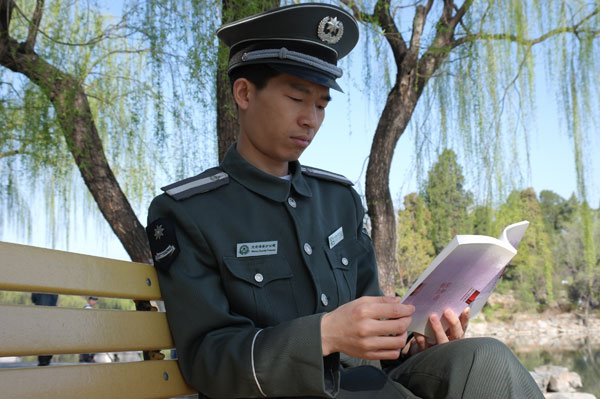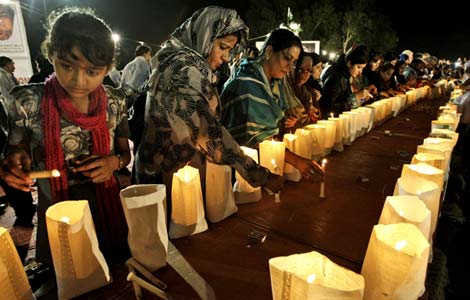Security guards moonlight as college students
Updated: 2013-06-25 07:18
By Zhao Xinying (China Daily)
|
||||||||
|
 |
|
Gan Xiangwei reads by the side of Weiming Lake at Peking University. A former security guard at Peking University, he obtained a college diploma from the university in 2012 and is now a published author and frequent public speaker. PROVIDED TO CHINA DAILY |
Almost 20 years later, after completing a basic education at the university mainly through self-study, he has earned degrees in law and business management from Tsinghua University and a top Party school for the training of Chinese officials.
He has even passed the National Judicial Examination, which qualifies him to be a lawyer in China.
Zhang, who is now the deputy director of campus security for the university, said his family is proud of him and he is satisfied with his life.
Zhang is not alone.
Wang Guiming, head of the security guards at Peking University, told China Daily that since 1994, more than 350 security guards employed there have gone to junior colleges or universities to pursue higher education.
"The number is increasing by 20 to 30 each year in recent years," Wang said.
Wang said most of the security guards at Peking University hold middle school or high school diplomas and are aged between 23 and 25, around the same age as the university's students.
"Students at the university have inspired our security guards a lot, making them believe that they also have the possibility to become university students if they study hard," Wang said.
Zhang first worked as a temp at the university for only 180 yuan ($29) a month after stints on construction sites and in factories. "I kept 80 yuan for living and sent the remaining 100 yuan home to support my family," Zhang said, recalling his earlier hard life.
He realized a college education could be his ticket to a better life after he heard a graduate of Peking University who worked for a foreign company could earn a monthly salary of more than 2,000 yuan at that time.
In 1997, he enrolled in a law course in a continuing education program at Peking University, which required students to pass 14 examinations before graduating with a diploma.
"I tried to find time to study at least four hours a day as a part-time student," he said. After completing his law studies, he took similar self-study courses for working adults at Tsinghua University and the Party School of the Central Committee of the Communist Party of China, and graduated with degrees in law and business management in 2005.
Wang, the head of campus security, said the university encouraged hard-studying graduates to pursue their dreams.
For example, although the dormitory had a curfew that specified lights should be turned off after 10 pm, guards were allowed to continue to study in the lighted meeting room.
Ge Daoshun, a sociologist from the Chinese Academy of Social Sciences, said Zhang and his colleagues set a good example in showing that all people can all strive to improve their lives and change their destiny through their own efforts.
"They demonstrated to people with their own experiences that anyone under any circumstance can find suitable resources and conditions to improve themselves," Ge said. "We should be adept to look for such resources and conditions, just like these security guards did."
In 2000, before Zhang gained his diploma from the junior college for working adults, he was promoted to squadron leader of the security guards.
In 2007, he was appointed as deputy director of campus security at the university, earning a salary of more than 4,000 yuan a month, more than 10 times what he earned when he started work at the university.
Unlike Zhang, some guards have chosen to change careers after they earned their college education.
Zhang Juncheng, who is not related to Zhang Guoqiang, was a security guard at Peking University 14 years ago, where he became known as "the university's first security guard to pursue higher education". He is now principal of a vocational school in Changzhi, Shanxi province.
After he completed basic law studies at Peking University through self-study, he went on to earn a degree in law from Shanxi Normal University.
Since he returned to Changzhi, his hometown, he has worked in several vocational schools as a teacher of economics, politics, philosophy and legal knowledge, and was also promoted to do managerial and administrative work.
In 2006, Chaoyue Vocational School in Changzhi invited him to be its vice-principal, offering him a monthly salary of more than 8,000 yuan. He was promoted to principal in September 2010.
Gan Xiangwei, another former security guard at Peking University, obtained a college diploma from the university with a major in Chinese language and literature in 2012 and is now a published author and frequent public speaker.
His 120,000-word book - Attending Peking University on My Feet - was published in June 2012, with a preface written by Zhou Qifeng, president of the university.
"The money I get from giving speeches is enough for me to maintain a good life," Gan said. "Now I have a rented room filled with books, a desk to read books on and enough money to buy any book I like without a glimpse of the price.
"This is a life I have been dreaming about since I was a child, and after years of hard work, I finally realized my dream."
zhaoxinying@chinadaily.com.cn
Most Viewed
Editor's Picks

|

|

|

|

|

|
Today's Top News
Berlusconi convicted on sex charges
US presses Russia over Snowden case
Xi: 'Exploration part of Chinese dream'
Chinese, Brazilian presidents discuss ties
China rejects Philippines' illegal seizure of reef
Immigration bill passes Senate vote
Liquidity squeeze bleeds equities
Surviving mountaineer in embassy
US Weekly

|

|














